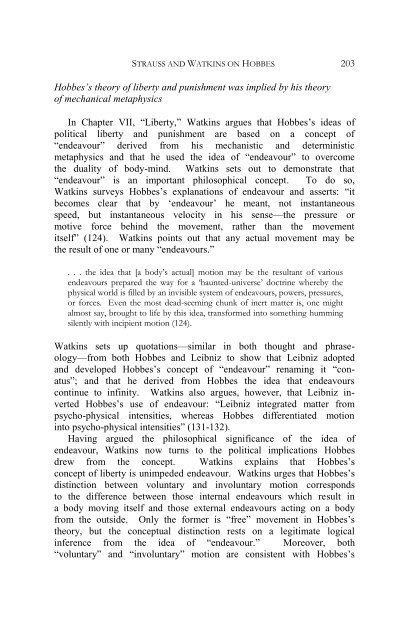Strauss and Watkins on Hobbes' Political Philosophy: A Review
Strauss and Watkins on Hobbes' Political Philosophy: A Review
Strauss and Watkins on Hobbes' Political Philosophy: A Review
You also want an ePaper? Increase the reach of your titles
YUMPU automatically turns print PDFs into web optimized ePapers that Google loves.
STRAUSS AND WATKINS ON HOBBES 203<br />
Hobbes’s theory of liberty <str<strong>on</strong>g>and</str<strong>on</strong>g> punishment was implied by his theory<br />
of mechanical metaphysics<br />
In Chapter VII, “Liberty,” <str<strong>on</strong>g>Watkins</str<strong>on</strong>g> argues that Hobbes’s ideas of<br />
political liberty <str<strong>on</strong>g>and</str<strong>on</strong>g> punishment are based <strong>on</strong> a c<strong>on</strong>cept of<br />
“endeavour” derived from his mechanistic <str<strong>on</strong>g>and</str<strong>on</strong>g> deterministic<br />
metaphysics <str<strong>on</strong>g>and</str<strong>on</strong>g> that he used the idea of “endeavour” to overcome<br />
the duality of body-mind. <str<strong>on</strong>g>Watkins</str<strong>on</strong>g> sets out to dem<strong>on</strong>strate that<br />
“endeavour” is an important philosophical c<strong>on</strong>cept. To do so,<br />
<str<strong>on</strong>g>Watkins</str<strong>on</strong>g> surveys Hobbes’s explanati<strong>on</strong>s of endeavour <str<strong>on</strong>g>and</str<strong>on</strong>g> asserts: “it<br />
becomes clear that by ‘endeavour’ he meant, not instantaneous<br />
speed, but instantaneous velocity in his sense—the pressure or<br />
motive force behind the movement, rather than the movement<br />
itself” (124). <str<strong>on</strong>g>Watkins</str<strong>on</strong>g> points out that any actual movement may be<br />
the result of <strong>on</strong>e or many “endeavours.”<br />
. . . the idea that [a body’s actual] moti<strong>on</strong> may be the resultant of various<br />
endeavours prepared the way for a ‘haunted-universe’ doctrine whereby the<br />
physical world is filled by an invisible system of endeavours, powers, pressures,<br />
or forces. Even the most dead-seeming chunk of inert matter is, <strong>on</strong>e might<br />
almost say, brought to life by this idea, transformed into something humming<br />
silently with incipient moti<strong>on</strong> (124).<br />
<str<strong>on</strong>g>Watkins</str<strong>on</strong>g> sets up quotati<strong>on</strong>s—similar in both thought <str<strong>on</strong>g>and</str<strong>on</strong>g> phrase-<br />
ology—from both Hobbes <str<strong>on</strong>g>and</str<strong>on</strong>g> Leibniz to show that Leibniz adopted<br />
<str<strong>on</strong>g>and</str<strong>on</strong>g> developed Hobbes’s c<strong>on</strong>cept of “endeavour” renaming it “c<strong>on</strong>-<br />
atus”; <str<strong>on</strong>g>and</str<strong>on</strong>g> that he derived from Hobbes the idea that endeavours<br />
c<strong>on</strong>tinue to infinity. <str<strong>on</strong>g>Watkins</str<strong>on</strong>g> also argues, however, that Leibniz in-<br />
verted Hobbes’s use of endeavour: “Leibniz integrated matter from<br />
psycho-physical intensities, whereas Hobbes differentiated moti<strong>on</strong><br />
into psycho-physical intensities” (131-132).<br />
Having argued the philosophical significance of the idea of<br />
endeavour, <str<strong>on</strong>g>Watkins</str<strong>on</strong>g> now turns to the political implicati<strong>on</strong>s Hobbes<br />
drew from the c<strong>on</strong>cept. <str<strong>on</strong>g>Watkins</str<strong>on</strong>g> explains that Hobbes’s<br />
c<strong>on</strong>cept of liberty is unimpeded endeavour. <str<strong>on</strong>g>Watkins</str<strong>on</strong>g> urges that Hobbes’s<br />
distincti<strong>on</strong> between voluntary <str<strong>on</strong>g>and</str<strong>on</strong>g> involuntary moti<strong>on</strong> corresp<strong>on</strong>ds<br />
to the difference between those internal endeavours which result in<br />
a body moving itself <str<strong>on</strong>g>and</str<strong>on</strong>g> those external endeavours acting <strong>on</strong> a body<br />
from the outside. Only the former is “free” movement in Hobbes’s<br />
theory, but the c<strong>on</strong>ceptual distincti<strong>on</strong> rests <strong>on</strong> a legitimate logical<br />
inference from the idea of “endeavour.” Moreover, both<br />
“voluntary” <str<strong>on</strong>g>and</str<strong>on</strong>g> “involuntary” moti<strong>on</strong> are c<strong>on</strong>sistent with Hobbes’s
















